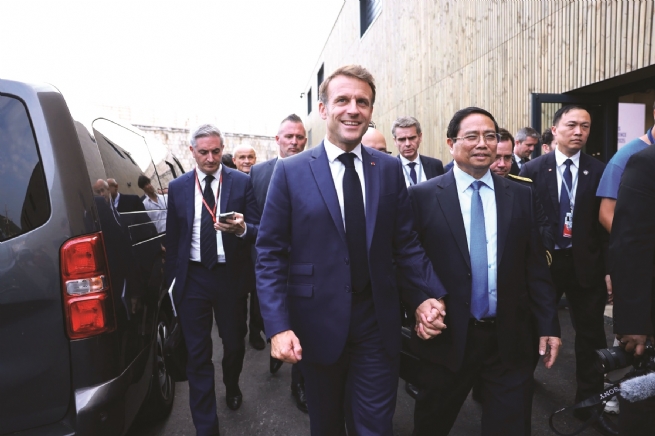3:45:08 PM | 11/19/2025
With a partnership spanning over half a century and growing into a comprehensive strategic partnership, Vietnam and France continue to strengthen political trust and promote cooperation across diplomacy, economy, investment, and sustainable development, aiming for a future of shared prosperity.
From a strong political foundation to dynamic economic cooperation
The upgrade of bilateral relations to the Strategic Partnership in 2013 marked a significant milestone, reflecting long-term vision and deep political trust. Regular high-level visits and exchanges have reinforced mutual understanding and guided concrete areas of cooperation. During the 50th anniversary of diplomatic relations in 2023, leaders of both countries reaffirmed their commitment to deepen the strategic partnership, linking economic development with green transformation, digital transition, and innovation.

Prime Minister Pham Minh Chinh meets French President Emmanuel Macron on the sidelines of the 3rd UN Ocean Conference (UNOC3) in Nice, France, June 2025
In 2024, Vietnam-France relations reached a breakthrough when the partnership was upgraded to the Comprehensive Strategic Partnership, making France the first EU country to hold such a partnership with Vietnam. This event opened prospects for deeper collaboration in areas including green economy, energy transition, culture, and innovation.
Economic and trade cooperation remains a cornerstone of the bilateral relationship. According to statistics, France is Vietnam’s fourth-largest trading partner within the European Union, after the Netherlands, Germany, and Italy. In 2024, bilateral trade reached US$5.42 billion, up 12.9% from 2023, with Vietnam exporting over US$3.4 billion, an increase of 7.5%, and importing more than US$2 billion, up 23.1%. In the first six months of 2025, total trade between Vietnam and France reached US$2.899 billion, with exports totaling US$1.919 billion and imports from France at US$979 million. Vietnam maintained a trade surplus of US$940 million with France in the first half of 2025.
Vietnam’s exports to France are mainly textiles, electronics, and agricultural and seafood products, while imports include aerospace equipment, pharmaceuticals, high-tech products, and consumer goods. The EU-Vietnam Free Trade Agreement (EVFTA) has facilitated market expansion for businesses in both countries, reduced tariffs, and promoted bilateral investment.
In terms of investment, France ranks 16th out of 147 countries and territories investing in Vietnam, with 700 active projects and total registered capital of US$3.95 billion. Major corporations such as TotalEnergies, Airbus, Sanofi, Schneider Electric, Decathlon, Danone, Saint-Gobain, Veolia, and CMA-CGM have expanded operations, contributing to technology transfer, improved governance standards, and workforce development.
France is also the largest bilateral ODA donor from Europe to Vietnam. From 1993 to 2022, total commitments in grants and concessional loans reached €16.7 billion, averaging around €100 million per year, focusing on infrastructure, technology transfer, green agriculture, and finance.
Sustainable development cooperation
In recent years, Vietnam-France cooperation has concentrated on strategic, future-oriented sectors. Laurent Saint-Martin, France’s Minister Delegate for Foreign Trade and French Nationals Abroad, said that innovation is a key pillar of the Comprehensive Strategic Partnership between the two countries.
Energy transition and green growth are central to bilateral cooperation, aligned with Vietnam’s commitment to achieve net-zero emissions by 2050. France actively supports Vietnam through the Just Energy Transition Partnership (JETP) and encourages businesses to invest in renewable energy.
Major corporations such as EDF, TotalEnergies, and Schneider Electric are implementing offshore wind and rooftop solar projects, as well as training engineers in digital energy technologies, exemplifying collaboration that links innovation with sustainable development.
In infrastructure and smart city development, France is a major partner of Vietnam. The Hanoi Metro Line 3 (Nhon-Hanoi Station), funded and technically supported by France, is a symbol of effective bilateral cooperation. French companies are also involved in water supply and wastewater projects, waste management, and green urban planning in Ho Chi Minh City, Can Tho, and Hai Phong.
Healthcare and pharmaceuticals are also highlights, with projects in workforce training, technology transfer, and European-standard drug production. Companies such as Sanofi and Servier operate manufacturing facilities in Vietnam while collaborating with major hospitals on research and community healthcare initiatives.
In high-tech agriculture, France supports Vietnam in building sustainable agricultural value chains, ensuring traceability, and meeting EU export standards. Collaborative programs between the French Research Institute for Development (IRD) and Vietnamese science institutes have improved crop and livestock varieties and enhanced climate resilience in the Mekong Delta.
According to Vietnam’s Ambassador to France Dinh Toan Thang, in a context where science, technology, and innovation are top priorities, the two countries should further enhance business cooperation, particularly in digital technology, smart energy, and sustainable development, while also strengthening the legal framework and intellectual property protection to create a favorable investment environment.
Giang Tu (Vietnam Business Forum)